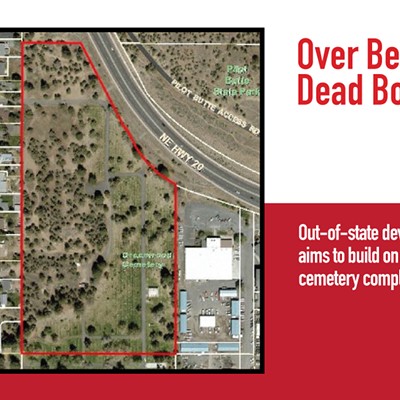What crystallized at the Jeff Merkley Town Hall, Sept. 1 was that the most pressing healthcare reform issue is actually education. Ignorance is alive and well in America. It makes us loud and stupid and it is no less insidious than the festering swine flu.
Ironically, Summit High School hosted the town hall, where some people showed up to disparage healthcare for all; a woman wearing a T-shirt that read, "I'll keep my guns, freedom and money. You keep the change" was accompanied by an elderly man who voiced his disappointment at how civil it all was in the end and asserted that he didn't wear slippers in public when he spied a pair of Birkenstocks. I was ashamed at the dearth of education apparent in the citizenry and wondered at the steel guts of any politician who endures such demoralizing displays. People arrived spewing the, "Stop Spending Money" mantra (as if programs like Social Security and Medicare aren't spending money. When and where is it worthy to vent national funds? Afghanistan, Iraq, not Darfur?) and "Stop Democratic Debt" (somehow I missed the fiscal surpluses the Republican administration bequeathed the new administration).
The Healthcare debate is not an issue that I pretend to understand fully, however I understand one aspect of the current state of healthcare and that is that people with pre-existing conditions as relatively common as eczema, asthma and depression are routinely denied coverage or offered premiums they could never afford. People who require medical attention are often bankrupted, even with insurance, because of high deductibles and caps on care. A federal program insuring affordable and accessible healthcare for everyone makes sense, ethically and economically.
So, arriving at the Merkley town hall, I made a couple attempts to ask questions of the people holding signs indicating that healthcare for each American was socialism and would cost too much money. The first man I approached and asked if I might ask a few questions of him, replied, "You bet!" He seemed excited. I asked him what his vision of healthcare for Americans was, if not this, and he said, "Everyone pays for themselves."
I inquired on behalf of those who had met hardship or been denied.
He said, "They should take care of themselves and pay for their own damn healthcare. I don't expect my neighbors to pay for my care, why should I pay for anyone else's?" He railed a bit about socialism and I asked him if that's what he thought the Federal Healthcare proposals represented, and he said, " Absolutely."
I forgot to ask him about V.A. healthcare and Medicare. I inquired about the concept of charity and he scoffed, "The Bible says God helps those who can feed themselves." I said I assumed he had enough money to pay for his own healthcare, and wanted to say that others might not be so lucky when he promptly corrected me and said, "I'm un-employed." I felt a little bit sick, and afraid of what boggling thing the next person holding some such sign might say. When Merkley came out, the hecklers had already identified themselves largely at the other end of the gym and somewhat clustered, but they were restraining themselves as the '"Respect Others" and "I Disagree" signs were also peppering the crowd. The best question posed was "How we gonna pay for it?" and to that Senator Merkley responded, "How are we going to pay for the current system of Healthcare?" which has experienced runaway inflation, with the insured bearing the costs of the uninsured. He urged the audience to "stay tuned," as the Finance Committee is slated to issue a report in the next two weeks on precisely that.
The fact that countries with strong national healthcare systems spend roughly half per citizen per year than what America spends on average, per citizen, per year is some indication that ultimately it is the savings and not the expense we might consider. What preventive and integrated healthcare might offer the country too, in savings ultimately is an idea the government is asking our populace to consider. What Senator Merkley supports is the very same health plan offered to state employees where several options are available and each individual chooses the plan that best suits their needs. Community health plans which would be regulated like public utilities are something Merkley would like to see emerge.
The questions, picked by way of raffle-type tickets, wore on and the reactions of the crowd waxed progressively bolder, as certain pertinent points emerged: One - that the proposals are many and complex. Two - Several states are running different experiments on a variety of healthcare operations and people are appearing to testify on the efficacy of the versions practiced; the government is apparently looking and listening, neither presuming, nor dictating. Three - costs of healthcare in America have been doubling every six to 10 years and will cost $40 trillion on the current path.
Countries with "socialized" medicine spend, on average, $2,265 per person, per year on healthcare. The U.S. currently spends $7,000 per person per year, (with the uninsured generally visiting Emergency Rooms and the insured's premiums ultimately bearing most of that additional cost). Americans wait longer to see their doctors than most people in countries with strong national healthcare systems. Unless you seek a specialist for elective surgery, then we promptly outperform other countries with "socialized medicine" because, of course, specialists abound in America. They earn more money. Merkley polled the attendees on what their preferences were by a show of hands among four options:
1. Single-payer system - where one organization pays all the doctors, pharmacies, hospitals on behalf of all insured citizens; one form, one payer, stream-lined administrative costs (met with a good show of hands).
2. Healthcare Exchange - with only private companies competing (some support).
3. Public Healthcare Exchange - (good support).
4. No Government Involvement in Healthcare (hoots and hollers).
I came away with a bit of a sorrowful sense of an entitled, confused culture, which will resist what is good for the many in preference for what is easy and familiar for itself. On the other hand, the "I Disagree" signs were an effective, dignified tool for the moments when the fanatics (who had this uncanny luck with their question tickets and gaining the floor), were embarrassing the rest of us. I came away also with a renewed respect for people who channel their burning desire to improve the plights of mankind by entering the hapless political arena. Jeff Merkley complimented the audience on being an engaged citizenry, a gracious gesture.
When all the healthcare proposals floating meet the 'Gang of Six' and the President's own proposal, we might end up with public, portable insurance-for-all, after all, despite the displays of conservative petulance that have been the center of the circus this summer.



















